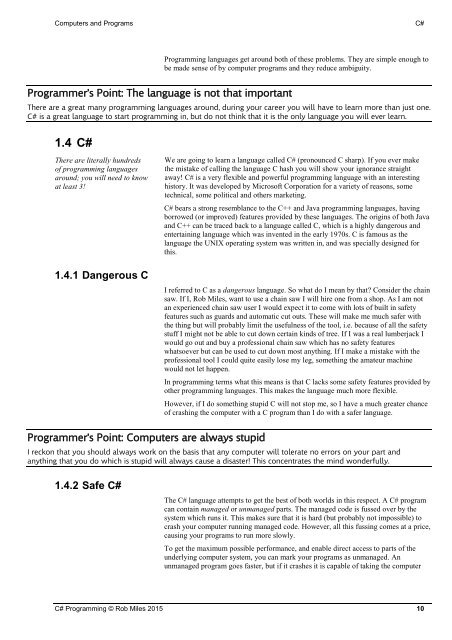C Programming Yellow Book
6019BjHWX
6019BjHWX
You also want an ePaper? Increase the reach of your titles
YUMPU automatically turns print PDFs into web optimized ePapers that Google loves.
Computers and Programs C#<br />
<strong>Programming</strong> languages get around both of these problems. They are simple enough to<br />
be made sense of by computer programs and they reduce ambiguity.<br />
Programmer’s Point: The language is not that important<br />
There are a great many programming languages around, during your career you will have to learn more than just one.<br />
C# is a great language to start programming in, but do not think that it is the only language you will ever learn.<br />
1.4 C#<br />
There are literally hundreds<br />
of programming languages<br />
around; you will need to know<br />
at least 3!<br />
1.4.1 Dangerous C<br />
We are going to learn a language called C# (pronounced C sharp). If you ever make<br />
the mistake of calling the language C hash you will show your ignorance straight<br />
away! C# is a very flexible and powerful programming language with an interesting<br />
history. It was developed by Microsoft Corporation for a variety of reasons, some<br />
technical, some political and others marketing.<br />
C# bears a strong resemblance to the C++ and Java programming languages, having<br />
borrowed (or improved) features provided by these languages. The origins of both Java<br />
and C++ can be traced back to a language called C, which is a highly dangerous and<br />
entertaining language which was invented in the early 1970s. C is famous as the<br />
language the UNIX operating system was written in, and was specially designed for<br />
this.<br />
I referred to C as a dangerous language. So what do I mean by that? Consider the chain<br />
saw. If I, Rob Miles, want to use a chain saw I will hire one from a shop. As I am not<br />
an experienced chain saw user I would expect it to come with lots of built in safety<br />
features such as guards and automatic cut outs. These will make me much safer with<br />
the thing but will probably limit the usefulness of the tool, i.e. because of all the safety<br />
stuff I might not be able to cut down certain kinds of tree. If I was a real lumberjack I<br />
would go out and buy a professional chain saw which has no safety features<br />
whatsoever but can be used to cut down most anything. If I make a mistake with the<br />
professional tool I could quite easily lose my leg, something the amateur machine<br />
would not let happen.<br />
In programming terms what this means is that C lacks some safety features provided by<br />
other programming languages. This makes the language much more flexible.<br />
However, if I do something stupid C will not stop me, so I have a much greater chance<br />
of crashing the computer with a C program than I do with a safer language.<br />
Programmer’s Point: Computers are always stupid<br />
I reckon that you should always work on the basis that any computer will tolerate no errors on your part and<br />
anything that you do which is stupid will always cause a disaster! This concentrates the mind wonderfully.<br />
1.4.2 Safe C#<br />
The C# language attempts to get the best of both worlds in this respect. A C# program<br />
can contain managed or unmanaged parts. The managed code is fussed over by the<br />
system which runs it. This makes sure that it is hard (but probably not impossible) to<br />
crash your computer running managed code. However, all this fussing comes at a price,<br />
causing your programs to run more slowly.<br />
To get the maximum possible performance, and enable direct access to parts of the<br />
underlying computer system, you can mark your programs as unmanaged. An<br />
unmanaged program goes faster, but if it crashes it is capable of taking the computer<br />
C# <strong>Programming</strong> © Rob Miles 2015 10


